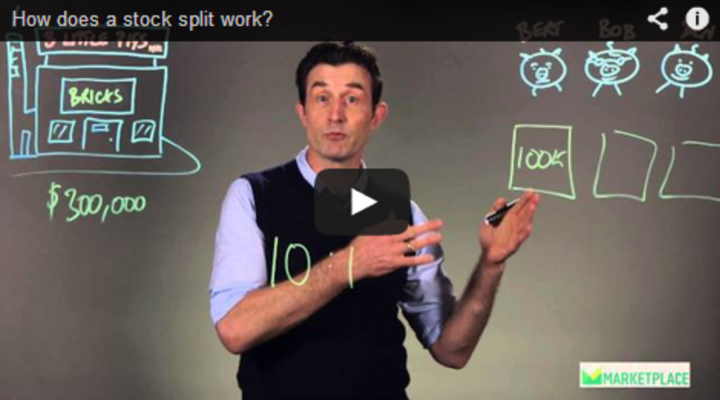
There are plenty of financial advisors out there who recommend that their clients take a hands-off approach to investing, and really only check on their portfolio once a quarter or even once a year.
If you’re that kind of person, and you’re invested in Apple, your latest stock check might have given you a bit of a jolt. That’s because in May, Apple shares hit $600. And today they’re at $90.
Hold on … What? NINETY dollars?
Yes, NINETY. But before you break into a cold sweat, check the number of shares you have.
Back in May, you had 100 shares, each of which was trading at $600. Today you’ve got 700 shares. That’s right, you’ve got seven times the number of shares. And guess what…$90 is about a seventh of $600.
Quick math check: 100 shares x $600 equals $60,000. Which is what you had in May.
And today? You’ve got 700 shares x $90, which equals $63,000. So, you’ve got about the same. Phew! In fact, you’ve got a little more. Yay!
So whatever happened between then and now seems to have done you a favor.
What happened was a stock split, specifically a seven-to-one stock split, which Apple implemented on June 9. The stock split is an interesting piece of gymnastics designed to please the investing crowd.
Specifically, it’s designed to make it easier to invest. Not cheaper, because the value of the investment remains the same, but easier. And that makes sense, if you think about it: The mental hurdle involved in buying multiple shares in a company is easier to overcome if those shares are trading at $90 than if they’re trading at $600.
So why don’t all companies split their stock? The fact is that many do.
When your individual shares have such a high dollar value that you worry they might deter a sector of the public from buying them, it’s worth splitting them. That way, your shares are more accessible to more people, and they may attract more investors. And your shares may go up.
It’s strategic. But splitting your stock, purely because you feel your company shares need a bit of a lift that you might get if they look less expensive, is a fool’s errand. That’s because there’s no guarantee that the shares will go up. They could go down. And if they do go down, then suddenly you have a stock that looks not inexpensive, but cheap. And who wants to be seen in a cheap stock?
There’s a lot happening in the world. Through it all, Marketplace is here for you.
You rely on Marketplace to break down the world’s events and tell you how it affects you in a fact-based, approachable way. We rely on your financial support to keep making that possible.
Your donation today powers the independent journalism that you rely on. For just $5/month, you can help sustain Marketplace so we can keep reporting on the things that matter to you.












